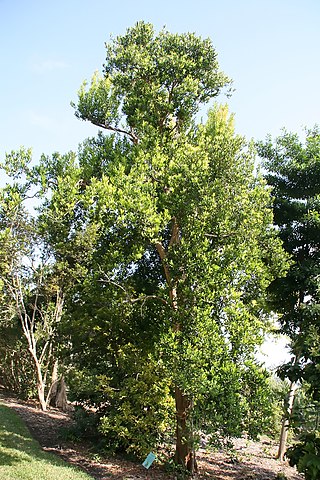Pimenta racemosa
Species of plant From Wikipedia, the free encyclopedia
Pimenta racemosa is a species of plant in the myrtle family (Myrtaceae) that is native to the Caribbean region. Common names include West Indian bay tree,[3] bay rum tree,[3] and ciliment.
| Pimenta racemosa | |
|---|---|
 | |
 | |
| Scientific classification | |
| Kingdom: | Plantae |
| Clade: | Tracheophytes |
| Clade: | Angiosperms |
| Clade: | Eudicots |
| Clade: | Rosids |
| Order: | Myrtales |
| Family: | Myrtaceae |
| Genus: | Pimenta |
| Species: | P. racemosa |
| Binomial name | |
| Pimenta racemosa (Mill.) J.W.Moore | |
| Synonyms[2] | |
|
List
| |
Uses
It is used in cooking and an essential oil is distilled to produce a fragrant cologne called bay rum; although the name is similar to names of flavored alcoholic beverages, the concentrated essential oil from the fruit is toxic and renders the product undrinkable.[4] The leaves are also used for herbal teas.[further explanation needed]
Anti-inflammatory and antinociceptive properties
Extracts from multiple varieties of Pimenta racemosa display anti-inflammatory properties. These properties are mediated in part by terpenes such as abietic acid and lupeol, which alter neutrophil migration into inflamed regions.[5][6]
Pimenta racemosa also demonstrates antinociceptive properties and has historically been used as an analgesic in the Caribbean.[7]
Description
The tree is 4–12 m tall and the white flowers, about 10 mm wide, become black, oval fruits measuring 7–12 mm.[8] The ideal conditions for P. racemosa are regular irrigation and bright sunshine.
Ecology
Pimenta racemosa is widely introduced and can become an invasive weed.[8][9] The plants are now grown widely in other tropical areas, including Oceania.
References
External links
Wikiwand - on
Seamless Wikipedia browsing. On steroids.



